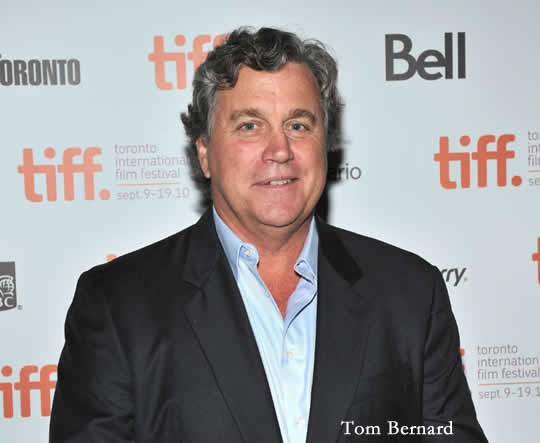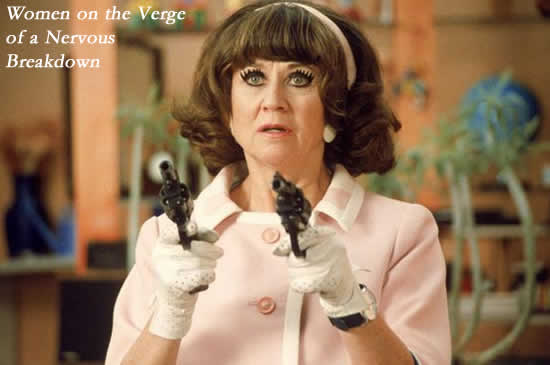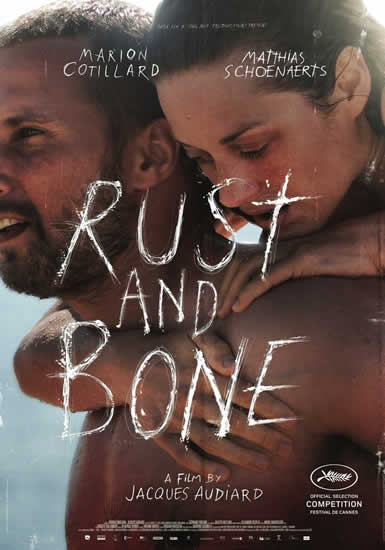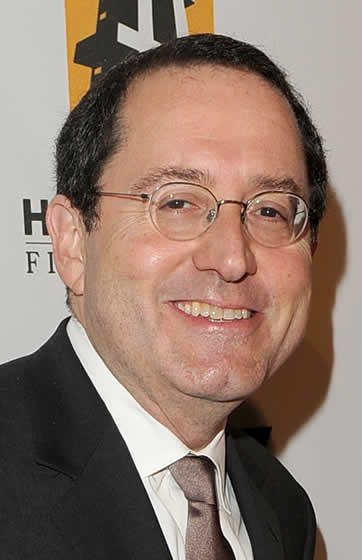 Sony Pictures Classics has been one of the main players in introduing the world cinema in U.S.
Sony Pictures Classics has been one of the main players in introduing the world cinema in U.S.
Michael Barker* and Tom Bernard are co-presidents of Sony Pictures Classics—an autonomous division of Sony Pictures Entertainment founded in January 1992 (with Marcie Bloom) that distributes, produces and acquires independent films from the United States and around the world.
The team has worked with many of the world’s finest independent filmmakers including Woody Allen, Pedro Almodóvar, Robert Altman, Allison Anders, Hector Babenco, Kenneth Branagh, Ingmar Bergman, John Boorman, Francis Ford Coppola, David Cronenberg, Luc Dardenne, Jonathan Demme, Guillermo del Toro, Atom Egoyan, R.W. Fassbinder, Mike Figgis, Hal Hartley, Agniezska Holland, James Ivory, Merchant Ivory, Jim Jarmusch, Norman Jewison, Neil Jordan, Charlie Kaufman, Akira Kurosawa, Neil LaBute, Ang Lee, Richard Linklater, Louis Malle, David Mamet, Errol Morris, Gary Oldman, Jean-Pierre, Sally Potter, Alan Rudolph, John Sayles, Paul Schrader, Fred Schepisi, Lily Tomlin, François Truffaut, Paul Verhoeven, Wong Kar Wai, Wim Wenders, and Zhang Yimou.
Bijan Tehrani, CWB’s Editor In Chief had the opportunity of interviewing Michael Barker about Sony Pictures Classics & World Cinema.
Bijan Tehrani: What is the background of Sony Pictures Classics and how did it start? And what is your approach in terms of introducing international cinema in the US?
Michael Barker: My partner Tom Bernard and I came together in 1981 at United Artists. We were working at United Artists Classics, which was more or less the first independent film distribution entity that was attached to a major studio. We both adored films and filmmakers; Tom and I at our universities (I was at the University of Texas, Tom was at the University of Maryland) ran film programs for the students. In the 70s, if you went to a big university, films were shown every night – that’s how he and I became film literate. When we came together in 1981, we were interested in international filmmakers and we used the Auteur theory as our guide, to trust in quality filmmaker from film to film and to try to stick to those filmmakers who are the very best in the world. At United Artists Classics, we met François Truffaut, Werner Herzog, Rainer Werner Fassbinder and several other European filmmakers, and our goal was to release these foreign-language films in the marketplace and to become successful with them. These films are so much tougher to get into the marketplace than the more mainstream commercial films.
After United Artists we went to Orion Classics in 1983, and there we had successes with independent films like Akira Kurosawa’s Ran which scored many nominations, as well as became very close to filmmakers like Louis Malle, Claude Berri, Wim Wenders, Bertrand Blier as well as American independent filmmakers – Jim Jarmusch, Richard Linklater…When the parent company, Orion Pictures, ran into financial trouble, we were invited to come to Sony to found Sony Classics. That was in January of 1992. Our first two films were Howards End, which was nominated for many Oscars including Best Picture, and won the Best Actress Oscar among others, and Indochine, with Catherine Deneuve, which was one of our many films that have won the Best Foreign Language Film Academy Award. We’ve been here now for 22 years and it never ceases to be exciting, especially when it comes to marketing and releasing these independent films. We produce or are a co-production partner on some of these, like Crouching Tiger Hidden Dragon, and we acquire others when the films are finished, like the Chilean No, which was nominated for Best Foreign Language film or The Gatekeepers, which was nominated for Best Documentary Feature this year.
 BT: The magic of your company is you pick films and screenplays that are absolutely great and you guys almost have more nominations in the foreign language films than any other company. How do you achieve that?
BT: The magic of your company is you pick films and screenplays that are absolutely great and you guys almost have more nominations in the foreign language films than any other company. How do you achieve that?
MB: Thank you for the kind comments. I think it’s having faith in the filmmakers we think can grow and make the best films. Take Pedro Almodovar: we released Women on the Verge of a Nervous Breakdown in 1988 at Orion Classics and here we are in 2013 about to release his next film I’m So Excited! We become involved at the screenplay stage on many of his pictures -we’ve released so many of his- and we have grown with him as he has grown as a filmmaker. The reason it works is not only in the selection of the filmmaker we believe in but also in the nature of our work. The secret is treating every film differently and releasing them in a way that’s suited to that particular film instead of having this machine-like mentality where all the films have to be released in exactly the same way.
BT: How do you see the market for international cinema changing overtime?
MB: It’s interesting because I was noticing something about last year or maybe the past year and a half. A movie like A Separation did 7 million dollars: that would have been unheard of several years ago. Right now we have much success with Amour from Austria: it’s been more successful than anyone ever anticipated since the subject matter is not so easy. I think the way the marketplace is now, those films that catch the wave, those films that cross over into the culture to become a success probably are more successful than foreign language films ever have before. That’s a good thing! The difficult part is that those films that are much smaller have a tougher time than ever making a mark in the market place. So what we have is the still serious problem of getting the smaller films noticed but you do have an optimistic situation where the films that succeed really are doing well.
BT: One thing I have noticed in the trends of international cinema is more use of English. Has that helped?
MB: I don’t know. I think what’s important in a foreign film is to be as authentic as possible. To force the English language because it might be more marketable – I just don’t believe that.
BT: What was your guess for the film that might win for the Best Foreign Language Film this year?
MB: That category has been so unpredictable for so long because it is not voted on by the entire Academy: it’s voted on by those Academy members who have seen all five films in a movie theater, at a screening or at a film festival. You can not vote in that category if you have seen a DVD and you need to ask the Academy for a ballot and tell the Academy where you have seen all five on the big screen. And what that causes is much fewer voters than in the main categories. That’s one of the reasons this category has been so difficult to predict over the years.
BT: Are you planning to continue your support for international cinema both with releasing and production?
MB: Absolutely! We’re going to continue what we’ve always done, which is to release the highest quality films we can find, and continue to support those filmmakers whom we think are at the top of their form, like Mike Leigh, like Jacques Audiard, like Michael Haneke, like Pedro Almodovar, or Zhang Yimou. We’ll continue!
BT: What is the latest film your company has been involved in the production of?
MB: Rust and Bone and Mike Leigh’s new movie. We produced The Inside Job and Fog of War, which won Oscars for Best Documentary. We produced Rachel Getting Married. We also co-produced Crouching Tiger Hidden Dragon. These were some of our bigger successes.
 * About MICHAEL BARKER
* About MICHAEL BARKER
As Co-President and Co-Founder of Sony Pictures Classics, which celebrated its 20th anniversary this past year, Michael Barker (with Tom Bernard), has distributed (and quite often produced), some of the finest independent movies over the past 30 years. Previously he was an executive at United Artists (1980-1983) and went on to co-found Orion Classics (1983-1991) and Sony Pictures Classics.
Over the span of his career, Barker’s films have received 135 Academy Award® nominations including several for Best Picture AMOUR; Woody Allen’s most successful film of all time, MIDNIGHT IN PARIS; AN EDUCATION; CAPOTE for which Philip Seymour Hoffman won the Academy Award® for Best Actor; CROUCHING TIGER HIDDEN DRAGON, recognized as the highest grossing foreign film of all time in North America; and HOWARDS END. His companies’ Academy Award® nominations resulted in 29 wins including five for Best Documentary Feature, most recently for INSIDE JOB and FOG OF WAR, and 12 for Best Foreign Language Film which include BABETTE’S FEAST, ALL ABOUT MY MOTHER, THE LIVES OF OTHERS, and this year’s A SEPARATION. Other notable award wins include 35 Independent Spirit Awards and 18 Golden Globe® Awards.
Barker has collaborated with some of the world’s finest filmmakers including Woody Allen, Pedro Almodovar, Louis Malle, and Zhang Yimou, all of whom he’s worked with on multiple occasions, as well as Robert Altman, Michelangelo Antonioni, Suzanne Bier, Ingmar Bergman, Francis Coppola, David Cronenberg, Guillermo del Toro, the Dardenne brothers, Jonathan Demme, R W Fassbinder, Michael Haneke, Nicole Holofcener, Akira Kurosawa, Norman Jewison, Ang Lee, Richard Linklater, David Mamet, Errol Morris, Roman Polanski, Sally Potter, Francois Truffaut, and Wim Wenders.
Over the years, Barker has released features from American masters (RACHEL GETTING MARRIED, SWEET AND LOWDOWN) and new American filmmakers (TAKE SHELTER, POLLOCK, SLACKER, WELCOME TO THE DOLLHOUSE, FROZEN RIVER); cutting edge films (KUNG FU HUSTLE, MOON, ORLANDO, RUN LOLA RUN, THE RAID: REDEMPTION); animated features (THE TRIPLETS OF BELLVILLE, PERSEPOLIS, WALTZ WITH BASHIR); feature documentaries (DOGTOWN AND THE Z BOYS, CRUMB, WINGED MIGRATION, IT MIGHT GET LOUD) and foreign films (RAN, A PROPHET, WHITE RIBBON, TALK TO HER, CENTRAL STATION, WINGS OF DESIRE).
He and his colleagues have also restored and theatrically reissued some of the great films of the past including THE PASSENGER, THE GARDEN OF THE FINZI CONTINIS, MURMUR OF THE HEART, and the classic films by Indian master Satyajit Ray.
Barker has been recognized for his work, and has received the Honors Award from the Directors Guild of America, the insignia of Chevalier of the Ordre des Arts et des Lettres from the French government, the FINDIE Spirit Award in Los Angeles, the GLAAD Media Award, a retrospective at the George Eastman House in Rochester, New York, and the Gotham Industry Lifetime Achievement Award from the Independent Feature Project in New York. Additionally, under his leadership, Sony Pictures Classics received the Special Recognition Award from the Sony Corporation CEO two years in a row (1999 and 2000).
He currently serves on the Museum of the Moving Image Board of Directors, the Entertainment Media and Technology Dean’s Advisory Board at the NYU Stern School of Business, the Visiting Committee to the Division of the Humanities at the University of Chicago, and has served as Adjunct Professor at the Columbia University School of the Arts Graduate Film Program. He has a Bachelor of Science degree from the University of Texas.
Recent releases include RUST AND BONE (Jacques Audiard), WEST OF MEMPHIS (Amy Berg), AMOUR (Michael Haneke), HYSTERIA (Tanya Wexler), TO ROME WITH LOVE (Woody Allen), NEIL YOUNG JOURNEYS (Jonathan Demme), SEARCHING FOR SUGARMAN (Malik Bendjelloul), CELESTE AND JESSIE FOREVER (Lee Toland Krieger) and SMASHED (James Ponsoldt).
Upcoming releases include NO (Pablo Larrain), I’M SO EXCITED (Pedro Almodóvar) THE GATEKEEPERS (Dror Moreh), AT ANY PRICE (Ramin Bahrani), THE COMPANY YOU KEEP (Robert Redford), WADJDA (Haifaa Al-Mansour), THE PATIENCE STONE (Atiq Rahimi), FILL THE VOID (Rama Burshtein) and BLUE JASMINE (Woody Allen). At the 2013 Sundance Film Festival, Sony Pictures Classics most recently acquired KILL YOUR DARLINGS (John Krokidas), AUSTENLAND (Jerusha Hess) and BEFORE MIDNIGHT (Richard Linklater).

